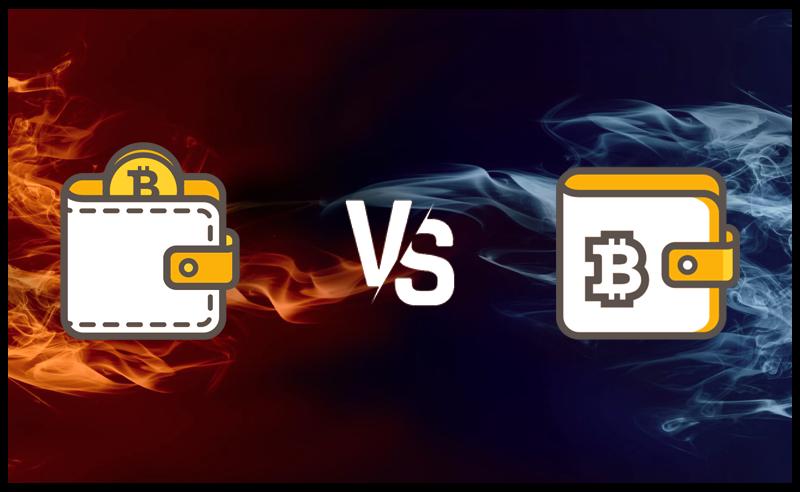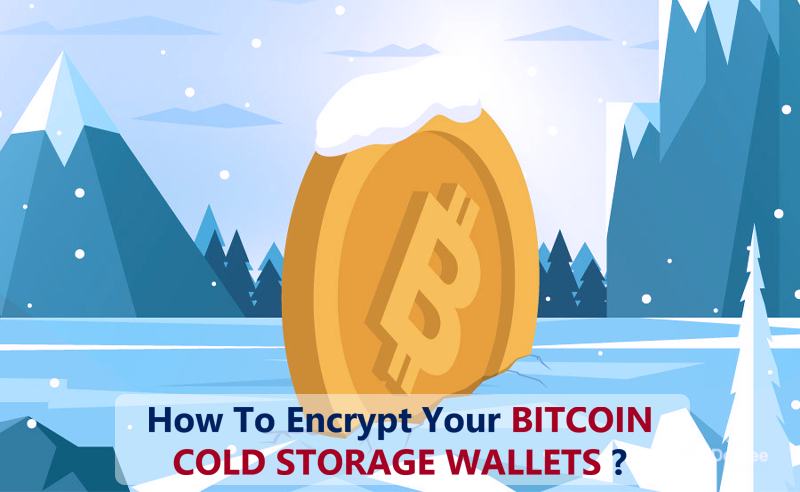Table of Contents
So, you’ve bought Bitcoins and now ready to HODL it for a lifetime. But where? Where are you planning to keep your Bitcoin? If you are thinking to leave your coins into your exchange wallet, then you are attempting a mistake. No matter what the situation is, you should never leave your cryptocurrencies in the exchange wallet as they are highly risky of security breaches and bankruptcy. Moreover, they are software wallet and store your private keys on servers which make it easy for hackers to get access to your keys.
Now the question is where you should keep your Bitcoin, if not in an exchange wallet, not in software wallet then where? The answer is Cold Storage. Don’t go on the name, there’s nothing cold about Cold storage wallets or hot about hot wallets. These are basically two types of wallets in cryptocurrencies among which cold storage wallets are considered safe. Let’s know what is Bitcoin cold storage.
What are Bitcoin Wallets?

Let’s understand are Bitcoin wallets first before stepping to the what is cold storage section. When you take out cash from ATM, where do you store it? In your wallet, Right! Cryptocurrency wallets do the same work for keeping crypto coins. However, just like cryptocurrency, these are also digital storage. The main concept of Bitcoin wallets is to keep your private keys secure and away from hackers. Now there are various types of cryptocurrency wallets, that includes cold storage and hot storage. As mentioned above cold storage includes all the wallets that work offline and are more secure than any other type of wallets. Hot storage includes all other types of wallets who work online, such as software wallet, web wallets, exchange wallets, mobile wallet, desktop wallet etc.
When you store your Bitcoins into hot storage, you actually save your private keys online or on the servers of the wallet which is highly risky as anyone can get access to them. In the past, there were many instances of hot storage hacks that happened in many big exchanges. So, if you want to keep your Bitcoins and altcoins safe, we hope you’ll invest some money on hardware wallets. To know the difference between Hot Storage and Cold Storage, continue with our what is Bitcoin cold storage.
What is Cold Storage vs Bitcoin Hot Storage

In cryptocurrency, cold storage refers to physical wallets that work offline while hot wallets refer to the online wallets. Storing Bitcoin private keys online is really risky as there are relatively more chances of getting it hacked which is why Bitcoin Cold Storage wallets are considered the best. However, if you still want to try out hot wallets, read our review of some of the best online wallets. If you want high levels of security in your wallets and does not require to access your Bitcoins instantly, cold storage is for you.
There are two types of cold storage, one which is the most recommended hardware wallet, second, the user-customizable paper wallets. Some of the most secure and top Bitcoin cold storages are Ledger Nano S, Trezor and Keepkey.
How to Encrypt Your Bitcoin Cold Storage Wallets?

Yes, cold storages are considered as the most secure type of Bitcoin wallet, but you still have to follow some precautions and security measure to save your currencies from going into wrong hands. These security measures include setting up a password on your hardware wallet, taking backup, enabling two-factor authentication and many more.
- As soon as you get yourself hardware or even a software wallet, and complete setting it up, lock it up using a strong password or passcode.
- After that, you should check out if two-factor authentication is enabled on your wallet or not. This adds up the second layer of security to your wallet, and keep it safe from unauthorised access.
- The next step is to keep taking backup of your wallet from time to time. This would help you recover the data stored in your wallet in case if it ever gets lost or broken or damaged.
- Another way to add additional security to your Bitcoin wallet is by using Mutlisig. In simple words, it is a method that requires the approval of multiple users before releasing funds from the wallet. This multi-signature transaction system can help you keep your Bitcoins extra secure from crypto criminal and hackers.
Advantages and Disadvantages of Bitcoin Cold Storages
Now that you are aware of what is Cold storage, let’s talk about its pros and cons. Unlike hot wallet, cold storage wallets are not that common among crypto users but as the time is passing more and more people are trusting it for keeping their coins. Some of the good points of Cold storages that makes it the best option for storing cryptos are given below:
- These cold storages are small devices that are easily be carried in pockets and bags. Moreover, there are hardware wallets like Ledger Nano S which is in the form of pen drive. This makes it kind of hideous and eventually the most secure option.
- You don’t need any internet connectivity to use hardware wallets, which makes it possible to access them anywhere and anytime. Moreover, it also eliminates the biggest risk of hack, theft and fraud.
- Unlike Hot wallet, Bitcoin cold storages are entirely in your control. There’s no involvement of the third party and all your private keys are stored on your hardware device only.
So, these were the major benefits of Bitcoin Cold Storages. Now, let’s check out their limitations also:
- If you are buying Hardware wallets for the first time, you might not be aware of the fact that they are pretty expective. Unlike Hot wallet, that are mostly free of cost, you would need to invest from $50 to $100 in purchasing hardware wallets. The more you’ll invest in your wallet, the more handy features you will get like transferring coins instantly etc.
However, if you are just planning to store a meagre amount of Bitcoins or crypto, you can still use Hot wallet but with precaution. - Another limitation of hardware wallets are that they don’t support as many cryptocurrencies as hot wallets. In online wallets, you can almost store more than 100 or 200 cryptos but in Hardware wallet, there are only a couple of crypto coins supported. Maybe as the crypto space is growing and moving forward, we will see more cold storages supporting multiple cryptocurrencies like that of hot wallets.

